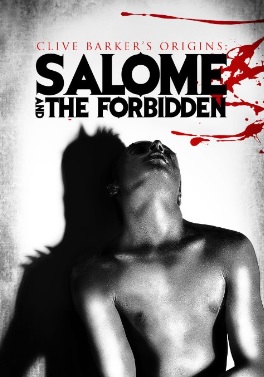
SALOME
Clive Barker’s early 1972 short film is based on Oscar Wilde’s play of the same name, ‘Salome’ (1891); the Biblical tale of Salome, stepdaughter of King Herod, who demands the head of John the Baptist as a reward for dancing the Dance of the Seven Veils.
Barker’s adaptation functions more effectively as a demonstration of his interest in the medium and as a student film calling card that it does as a satisfying experience for an audience. Clearly never intended for commercial distribution, and only first even made available for public viewing as an extra feature on Anchor Bay’s release of the original Hellraiser trilogy, it gives little indication of the kinds of themes and ideas Barker was to explore in his future work as a writer-director.
Devoid of dialogue, the film depends on a haunting and experimental score to set the tone and atmosphere for the film, which it does fairly efficiently. Yet film itself is choppily put together with seemingly very little attempt at any real discernible narrative clarity. This proves frustrating and off-putting in equal measure, serving to alienate certainly anyone with no prior familiarity with Wilde’s play (this reviewer included) and probably even those who do have previous knowledge of the work.
The grainy black and white footage does lend the film a certain ambience and works in its favour, as does the immediacy of the 8mm film stock. And some of the imagery, such as Salome’s dancing, is striking and possesses a certain hypnotic beauty that will keep you watching, if still altogether confused and bewildered.
Ultimately, however, there is little here to attract or engage anyone other than the most hardened followers and devotees of Barker’s work. Indeed, it is doubtful that the man himself would ever consider this as a solid example of his directing talent. Anyone who does watch it should think of it amore as a young talent finding his footing and developing his filmmaking technique.
Experimental in every – unfortunately, mainly negative – sense of the word, Salome is really only notable for the novelty of seeing Pinhead himself, Doug Bradley, in a much earlier role before his success as the lead cenobite, and is definitely not a film to seek out in order to appreciate Clive Barker at his best and is certainly one-time-only viewing. Starting somewhere later in his filmography would certainly prove to be more rewarding.
THE FORBIDDEN
Clive Barker’s take on the classical tale of Faust is without doubt the more technically accomplished and polished of the director’s two early short works. The film employs various techniques and styles of filmmaking – including animation – to tell the tale, and possesses a surreal tone and imagery. Unlike Salome (1973), it hints at some of the themes and idea that Barker was to explore in more horror-oriented detail in future works of his such as Hellraiser, such as sacrifice in the pursuit of pleasure and knowledge.
As with Salome, the film is bereft of dialogue, with a similarly haunting score. This time, however, the narrative is rather more focused and far less disjointed, offering a more satisfying and cohesive experience for the audience. The story is conveyed through a series of increasingly bizarre, nightmarish imagery and culminates in a flaying scene that surely predicts similar imagery in Barker’s most renowned cinematic work.
However, at 35 minutes, the film is something of an endurance test to get through in one sitting. It has little new to bring to a story that – like Salome – has been told innumerable times previously (an extended scene of Barker himself prancing around the screen, naked, penis erect, notwithstanding). Once more, this is clearly the work of a student filmmaker testing the waters and learning his craft and really only worth viewing for the most hardcore of Barker devotees, with precious little in the way of entertainment or satisfaction for a mainstream, non-Barker savvy audience.
This DVD release by MVD Visual has 5.1 sound, which is perfectly serviceable, especially for films without dialogue. Picture quality almost becomes a moot point given the source of the films; they look as good here as they surely ever will.
The sole extra feature on the disc is a 16 minute collection of interviews with Barker, writer Peter Atkins and actor Doug Bradley in which they reflect on the making of the two short films; the inspiration for them and the processes and techniques used.
Review by Matt Mills
| Released by Seraphim |
| Region 1 |
| Not Rated |
| Extras : |
| see main review |